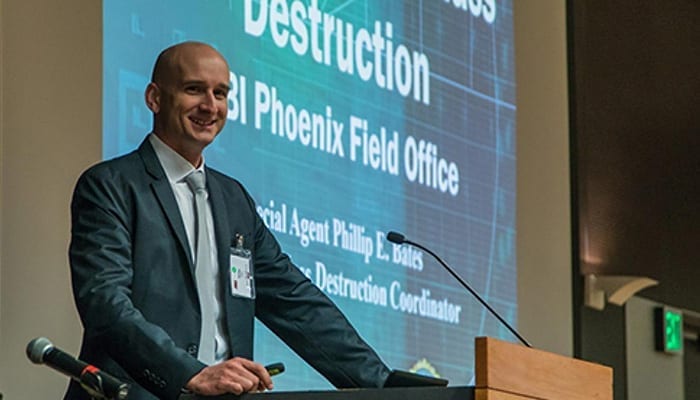Biosecurity professionals from across the U.S. and Mexico gathered on Arizona State University’s Tempe campus Dec. 7 and 8 to discuss multidisciplinary approaches and perspectives on biosecurity.
The two-day Arizona Biosecurity Workshop was organized by several ASU departments and schools, providing a forum to discuss biosecurity risks such as do-it-yourself biology, dual use research of concern (DURC), oversight of safety and security at iGEM, existing and proposed governance mechanisms for emerging technologies and community involvement in conversations about novel technologies.
Academia, emergency response, governance, regulatory and security professionals collaborated during the event. Scientists and professionals network in other settings, but this gathering was designed to be inclusive and to challenge presenters and attendees to work together so that no one was excluded from the conversation.
“The issues we discussed at the workshop sit in the white spaces between disciplines, so it is important to master the skills needed to work in this complex intellectual environment,” said Collins, Virginia M. Ullman Professor of Natural History and the Environment. “The rapid pace of technology development means we have to anticipate new challenges and be ready to react to them.”
Biosecurity protocol and emergency preparedness professionals participated to facilitate a more targeted response to potential emergencies. Presenters included Special Agents from the FBI Headquarters in Washington, D.C. and the FBI Phoenix Weapons of Mass Destruction team; representatives from the Centers for Disease Control (CDC) Biological Select Agent and Toxin (BSAT); and the NIH Office of Science Policy Division of Biosafety, Biosecurity, and Emerging Biotechnology.
“As biological science and technology diffuses into wider communities, we need new strategies to raise awareness of biosecurity issues and to alter norms and practices related to security,” said Megan Palmer, Stanford University Center for International Security and Cooperation senior research scholar. “There are many opportunities to both develop and evaluate different approaches in this field.”
Luis Alberto Ochoa Carrera, BSL-3 laboratory coordinator and a founding member of the Mexican Biosafety Association, took this perspective international with his presentation on biosecurity in Mexico. Ochoa Carrera also participates in the ASU and AmexBio program, part of the ASU in Mexico initiative.
“In Mexico, many different agencies decide what a biosecurity professional is, and there is a lack of standard training for people in the field,” said Ochoa Carrera. “This conference furthers the dialogues about a potential international biosecurity certification.”
Conference sponsors included the U.S. Department of Justice, the FBI, the Arizona Biosafety Alliance (AZBA, an affiliate of ABSA International), Camfil Clean Air Solutions, CEM Testing and Certification Services and WVR. ASU partners included Environmental Health and Safety, Ira A. Fulton Schools of Engineering, School for the Future of Innovation in Society, Knowledge Enterprise Development, School of Life Sciences and School of Molecular Sciences.
Source: Arizona State University, AzCHAR, edited for context and format by Global Biodefense.



